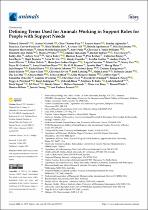Defining Terms Used for Animals Working in Support Roles for People with Support Needs
Date
2022Author
Howell, Tiffani J
Leanne, Nieforth
Clare, Thomas-Pino
Samet, Lauren
Metadata
Show full item recordAbstract
The nomenclature used to describe animals working in roles supporting people can be
confusing. The same term may be used to describe different roles, or two terms may mean the
same thing. This confusion is evident among researchers, practitioners, and end users. Because
certain animal roles are provided with legal protections and/or government-funding support in some
jurisdictions, it is necessary to clearly define the existing terms to avoid confusion. The aim of this
paper is to provide operationalized definitions for nine terms, which would be useful in many world
regions: “assistance animal”, “companion animal”, “educational/school support animal”, “emotional
support animal”, “facility animal”, “service animal”, “skilled companion animal”, “therapy animal”,
and “visiting/visitation animal”. At the International Society for Anthrozoology (ISAZ) conferences
in 2018 and 2020, over 100 delegates participated in workshops to define these terms, many of whom
co-authored this paper. Through an iterative process, we have defined the nine terms and explained
how they differ from each other. We recommend phasing out two terms (i.e., “skilled companion
animal” and “service animal”) due to overlap with other terms that could potentially exacerbate
confusion. The implications for several regions of the world are discussed.

